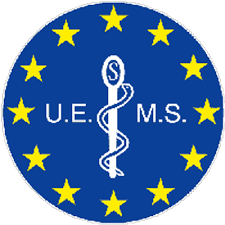EJD endorses UEMS Statement on Impact of the COVID - 19 pandemic on the CME/CPD of European Specialist Doctors

EJD endorsed a statement produced by the European Union of Medical Specialists (UEMS) on the impact the COVID - 19 pandemic has had on the CME/CPD of European medical specialists. The document was adopted by the Council Meeting of UEMS that took place earlier in December 2022 in Athens, Greece. The statement reads as follows:
Preamble:
The COVID - 19 pandemic has had great effects on the work of European specialist doctors as well as colleagues worldwide. The workload has increased because of diagnosing and treating patients with this serious disease.
The pandemic has also had huge impact on the Continuous Medical Education (CME) and Continuous Professional Development (CPD) of physicians. Live meetings were canceled and the majority of events have been delivered virtually. The amount of especially external CME/CPD that specialists attended during the pandemic was greatly diminished in most European countries.
The pandemic has major consequences for the future of CME/CPD for European specialists even after the pandemic slowly is getting less severe especially based on the increasing amounts of vaccinations.
UEMS (European Union of Medical Specialist) stresses the following regarding the impact of COVID-19 on the CME/CPD of European Specialists:
Participation in CME/CPD
• It has been very important that specialists have taken part in CME/CPD especially during the pandemic now even if traditional face-to-face events have not been available to the same extent.
• The pandemic has made it even more crucial to take part in external (including virtual) CME/CPD since workplace CME/CPD and usual professional collaboration with colleagues may have been limited.
• CME/CPD regarding diagnosing, treating, and preventing COVID-19 infections should be a priority for European specialists for them to be well prepared to treat present and future patients with COVID-19.
• It is also important to work in interdisciplinary and interprofessional expert groups regarding CME/CPD about COVID-19.
• Individual specialists must also take responsibility not only to attend but also to record and, when necessary to report their annual CME/CPD activities, in general.
Responsibility of the employers
• Employers must make CME/CPD possible for specialists, especially during and after these difficult circumstances. This includes protected time for virtual CME/CPD as well as live and hybrid meetings.
• Specialists need to have the necessary technical equipment, safe connections, and necessary skills to participate in the new ways of virtual CME/CPD.
• The pandemic has revealed that it is crucial to continuously adapt healthcare to new knowledge and thus, CME/CPD for doctors should be a priority even for the employer.
• The pandemic also has shown that it is possible to minimize the administrative burden for doctors so that they can concentrate on their main task – to treat patients. This should be a wake-up call for the employers to decrease the administrative tasks for doctors and let them use that time freed up for CME/CPD.
• It is most important always to guarantee work safety and well-being of doctors and especially during pandemic. CME/CPD can also be a tool in this respect.
New methods of CME/CPD and their quality assurance
• Returning ”back to normal” will not represent restarting at the exact same situation when the COVID-19 pandemic started.
• However, face-to-face interaction between colleagues is crucially important and therefore live meetings are still in great demand.
• Even after returning to the “new normal” while traditional CME/CPD will still be very important, new formats (mainly self-learning approaches using internet tools and resources), should be developed and supported also because they are less costly for the participating doctors.
• Quality assurance and feedback from the participants regarding the new learning methods is very important, especially the degree of the interactivity of the new methods.
• The new virtual learning methods must be assessed also regarding the way their educational needs and educational outcomes are defined.
• The development of new methods and ways for CME/CPD (virtual meetings, webinars, simulations etc.) is needed also for healthcare to be better equipped for future crises like the one we have now faced. Lessons learned from the pandemic must include those regarding CME/CPD.
Associated Files
Associated Links
You might also enjoy
-

Protecting the Mental Health of Europe’s Health Workforce
MeND Survey Report
-

European and Latin American Physicians Declaration on the Protection of Life and Health in Gaza
As physicians speaking on behalf of leading professional institutions and associations across Europe and Latin America, we denounce the grave suffering endured by the civilian population of Gaza.
-

European Junior Doctors condemns attacks on healthcare and the obstruction of humanitarian aid in Gaza amid unfolding famine
European leaders must uphold international humanitarian law, protect civilians and healthcare workers, and take immediate action to stop the devastation
